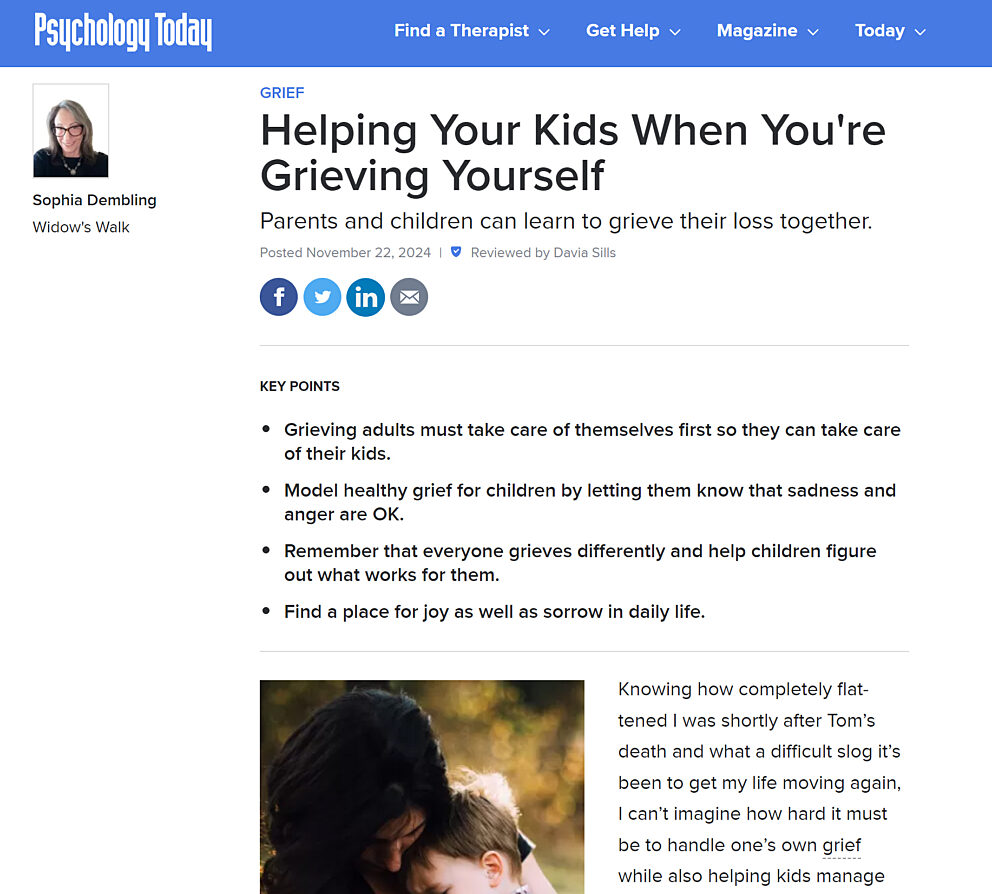Knowing how completely flattened I was shortly after Tom’s death and what a difficult slog it’s been to get my life moving again, I can’t imagine how hard it must be to handle one’s own grief while also helping kids manage theirs. There were days I could barely drag myself out of bed. Days when I was crying more than not. Days when feeding myself seemed an insurmountable challenge. Helping kids through this incredibly complicated time, too? Whew.
November is Children’s Grief Awareness Month, so I chatted with Alysha Lacey, director of program services at the Dougy Center, an Oregon-based nonprofit focused on supporting families in grief, to offer some suggestions for helping kids navigate loss.
Start with yourself
Before we talk about kids, though, let’s talk about you. It’s that whole “put your oxygen mask on first” thing: If you want to help your kids, you must take care of yourself.
“We talk about doing even basic care. Don’t forget to eat a meal, get a good night’s sleep, try to get some movement,” says Lacey. “It seems so simple but easily goes by the wayside. Maintaining those tiny necessary routines will give you more energy to care for a grieving child.”
And yeah, we know moms are used to doing it all for everyone, but now is not the time to be superwoman. “Be open to accessing support, accepting help when it’s offered, and asking for it when it’s not.”
Take advantage of any and all resources to help you process your own grief so you don’t overburden your children; you don’t want them to feel like they must take care of you. Lean on support groups, a therapist, friends who can talk about grief (sadly rare), or a religious advisor. Trying to stifle your grief for the sake of the kids won’t work, so take it someplace where you can air it freely and then return to parenting with the emotional wherewithal to be present for your children’s needs.
That’s not to say you should never let your kids see you cry; your job is to model healthy grief, and sometimes that means crying. Just help them understand that being sad and being healthy are not mutually exclusive, and assure them through word and deed that you’re strong enough to help them with their feelings.
Let them grieve their way
So, what do your kids need from you right now?
“Ultimately, kids need someone to listen and provide them support and be present for them,” says Lacey. “To provide them different kinds of ways and opportunities to grieve.”
Start by letting the kids decide if they want to attend the funeral. With young children especially, you’ll need to explain exactly what it will be like—what will happen, how long it will be. “Involve them in the process. Explain, ‘This is what things might look like; this is what the body might look like.’ Describe as best you can what to expect. Let them decide if they want to attend or not, and if they want to take part, to choose music or a reading.” At the same time, leave them a last-minute out; have somebody available for a backup plan should they change their mind about attending.
From then on, it’s a matter of paying attention, knowing your kids, and sometimes trial and error. “Some kids might be really physical in their grief; it’s helpful for them to have options to move their body, get emotions out in a productive way,” says Lacey. “For some, it’s drawing or music or writing or something more quiet and individual.”
Normalize the grief by letting them know that sometimes you feel mad or sad or whatever they’re feeling, too. “Acknowledge that you hear them. At the same time, be soothing, perhaps asking, ‘Is a hug helpful, or do you need some space? Definitely don’t try to take it away by saying, ‘Oh, your dad wouldn’t want you to be crying; he would want you to be happy.’”
Crucially, remember that everyone grieves differently. “It’s important to have the space for different styles of grief. Remember that most of us don’t know how to do this. A young kid isn’t going to necessarily know what to do and will look to a parent to provide guidance. [For example] do we acknowledge important dates? It’s a matter of working together, figuring it out together. Give them options. If you want to celebrate, what would be a fun thing to do? Have a cake or a hike in the woods and talk about it? Look at pictures? Invite people or not?”
Do they need a support group?
As with everything else about parenting, deciding whether a support group or therapy is in order will depend on the child. “Therapy or peer support groups can always be helpful,” says Lacey, “and it doesn’t necessarily have to be at the time of crisis. It could be if you’re noticing significant impairment in daily functioning.”
School will be interrupted, but if it’s vastly interrupted, if they can’t seem to get back on track, if grades start really suffering, intervention might be in order. The Dougy Center offers peer-based support groups: “It really helps. The prevalence of grief is quite high. Being with other kids who’ve had this experience is really normalizing.”
Teens, of course, will have different needs from young children. “Developmentally, teens are going to be more focused on friends. It could be more difficult to have them open up. But as long as they’re talking to somebody, it doesn’t need to be you. It could be a family friend, a therapist, a school person, or something.”
Find space for joy, too
And please make sure that your family life is not all grief all the time. If your child has a success, don’t immediately lament that Dad isn’t there to appreciate it. Holidays can be tough (even in the best of times) but don’t let them be mournful; make sure your kids feel free to be joyful.
Many of us maintain small shrines for our loved ones, but keep them small and personal, perhaps in your bedroom, so the house doesn’t become a relentless reminder of the loss. There is life after grief, and your job is to keep that hope alive—for your kids and yourself.
The Dougy Center website has lots of terrific resources for helping families through grief.



